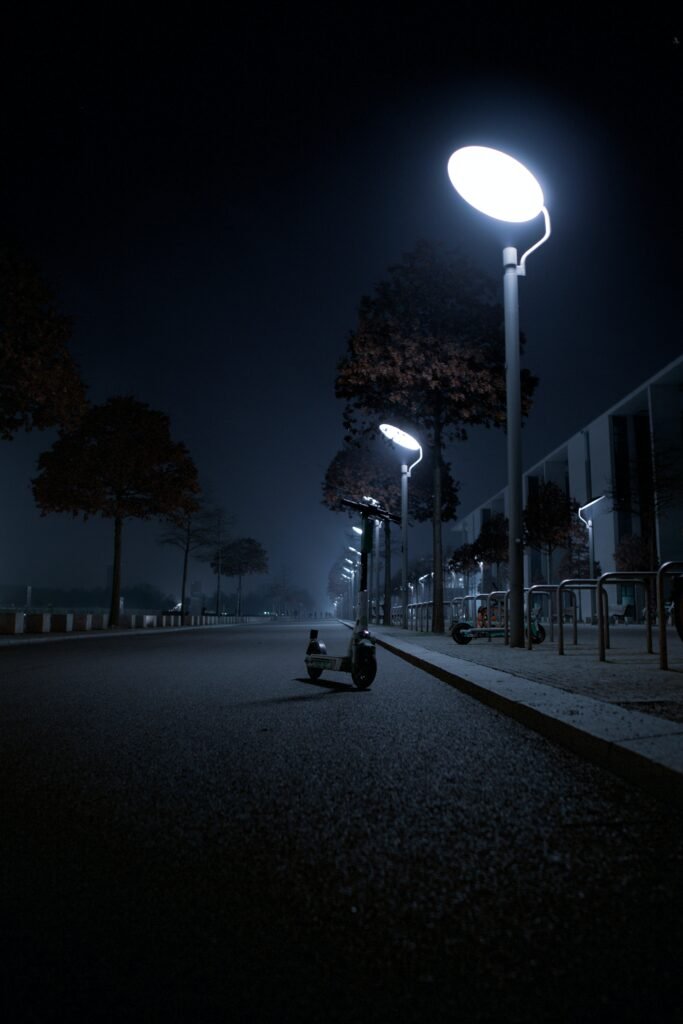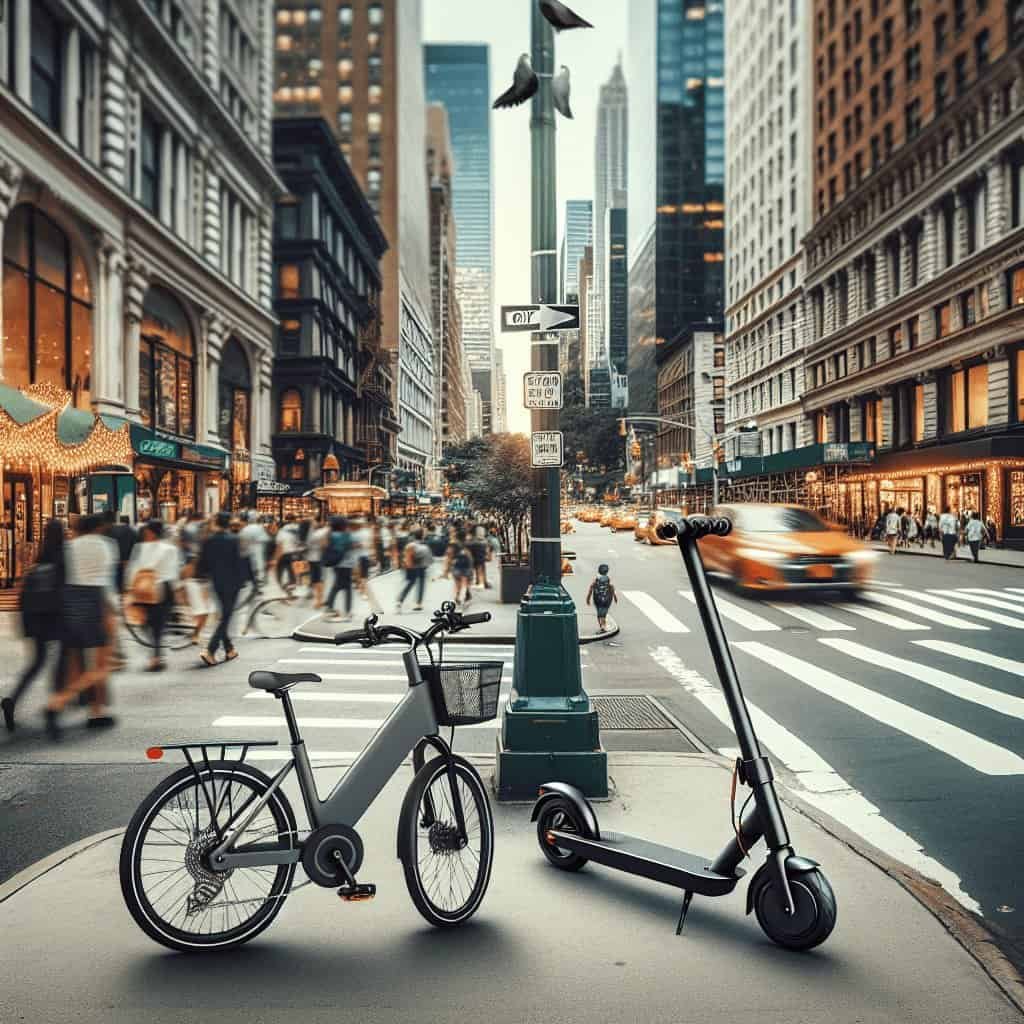Are you considering purchasing an e-bike or e-scooter in New York City? Well, before you make your decision, there’s some important information you need to know. It turns out that there may soon be a licensing requirement for these electric modes of transportation in the Big Apple. This means that just like cars, motorcycles, and even regular bicycles, you may need to have a license plate for your e-bike or e-scooter. With their rising popularity and potential impact on mobility, it’s not surprising that authorities are considering this step. So, if you’re thinking about zipping around the city on an e-bike or e-scooter, keep an eye out for any updates on the licensing requirements.

Overview of E-Bikes and E-Scooters in NYC
Introduction to E-Bikes and E-Scooters
Welcome to this comprehensive article on E-Bikes and E-Scooters in New York City (NYC). In recent years, these electric-powered modes of transportation have gained significant popularity as convenient and sustainable alternatives to traditional bikes and cars. This article will explore the current regulations, benefits, challenges, licensing requirements, safety considerations, implications of licensing, comparison with other cities, public opinion, alternative approaches to regulation, and the future of E-Bike and E-Scooter licensing in NYC.
Current Regulations for E-Bikes and E-Scooters in NYC
Currently, the regulations regarding the use of E-Bikes and E-Scooters in NYC are somewhat complex and have been a subject of debate. E-Bikes are classified into three categories based on their maximum speed and the method of propulsion, while E-Scooters are defined as electric scooters with a maximum speed of 20 miles per hour. At present, under NYC traffic laws, pedal-assist E-Bikes are legal, while throttle-operated E-Bikes and E-Scooters are not.
Benefits and Challenges of Using E-Bikes and E-Scooters
E-Bikes and E-Scooters offer numerous benefits to individuals and cities. They provide an efficient and eco-friendly mode of transportation, reducing the congestion and emissions associated with conventional vehicles. Additionally, they offer a cost-effective way to commute, especially for short distances. However, there are also challenges associated with their use, including concerns about safety, infrastructure limitations, and the need for proper regulations.
Growing Popularity of E-Bikes and E-Scooters in NYC
The popularity of E-Bikes and E-Scooters in NYC has been on the rise. With the increasing awareness of the environmental impact of traditional transportation and the convenience provided by electric-powered options, more individuals are opting for E-Bikes and E-Scooters as their preferred mode of commuting. This growing demand has spurred the need for clear and comprehensive regulations to ensure the safe and responsible use of these vehicles.
Licensing Requirement for E-Bikes
Existing Licensing Requirement for E-Bikes in NYC
Currently, there is no specific licensing requirement for E-Bikes in NYC. However, riders must adhere to certain regulations, such as the maximum speed limit and the classification of their E-Bike. Pedal-assist E-Bikes, also known as Class 1 and Class 2 E-Bikes, are allowed on NYC streets, while throttle-operated E-Bikes, classified as Class 3, are prohibited.
Discussion on the Need for Licensing
The absence of a specific licensing requirement for E-Bikes has sparked debates among policymakers and stakeholders. Some argue that introducing a licensing system for E-Bike riders would ensure accountability and responsible riding behavior. It would also provide a means of identification and enforcement in the event of accidents or traffic violations.
Proposed Changes to E-Bike Licensing Requirement
In recent years, there have been discussions about implementing a licensing requirement for E-Bike riders in NYC. Proposed changes range from simple registration processes to comprehensive licensing systems that include training programs and knowledge tests. These changes aim to create a safer and more regulated environment for E-Bike riders and other road users.
Impact of Licensing on E-Bike Ridership
The introduction of a licensing requirement for E-Bikes could potentially have both positive and negative impacts on E-Bike ridership in NYC. On one hand, it may act as a deterrent for some potential riders who find the licensing process cumbersome or unnecessary. On the other hand, it could enhance the perception of legitimacy and safety for E-Bikes and attract more riders who value the regulated environment.
Licensing Requirement for E-Scooters
Existing Licensing Requirement for E-Scooters in NYC
Similar to E-Bikes, there is currently no specific licensing requirement for E-Scooters in NYC. However, the use of throttle-operated E-Scooters is prohibited under NYC traffic laws. This means that only certain types of E-Scooters, such as those with pedal-assist, are allowed on the streets.
Discussion on the Need for Licensing
As with E-Bikes, the need for a licensing requirement for E-Scooters has generated discussions among policymakers and stakeholders. Due to the similarities in usage and potential safety concerns, some argue that introducing a licensing system for E-Scooters would promote responsible riding behavior and accountability.
Proposed Changes to E-Scooter Licensing Requirement
Proposed changes to the licensing requirement for E-Scooters in NYC mirror those for E-Bikes, ranging from simple registration processes to comprehensive licensing systems. By implementing such changes, policymakers aim to address safety concerns, improve enforcement measures, and create a more regulated environment for E-Scooter riders.
Impact of Licensing on E-Scooter Ridership
The impact of implementing a licensing requirement for E-Scooters on ridership in NYC is uncertain. It is possible that some prospective riders may be deterred by the extra steps involved in obtaining a license, while others may appreciate the added safety measures and choose to embrace E-Scooters as a reliable mode of transportation.
Safety Considerations
Concerns about Speeding E-Bikes and E-Scooters
One of the key safety concerns surrounding E-Bikes and E-Scooters is their potential to reach high speeds, especially when operated by inexperienced or reckless riders. This has raised concerns about collisions with pedestrians, other cyclists, and vehicles on the road.
Addressing Safety Issues through Licensing
Licensing E-Bike and E-Scooter riders could play a significant role in addressing safety concerns. By implementing regulations and safety training programs as part of the licensing process, riders can gain the necessary knowledge and skills to operate their vehicles safely and responsibly.
Educational Campaigns and Training Programs
In addition to licensing, educational campaigns and training programs can contribute to improving safety. These initiatives can raise awareness about the rules of the road, promote responsible riding behavior, and encourage compliance with traffic laws.
Enforcement of Safety Regulations
Enforcement of safety regulations is crucial to ensure compliance and deter reckless behavior. Law enforcement agencies should play an active role in monitoring E-Bike and E-Scooter riders, issuing citations when necessary, and implementing measures that promote safe riding practices.

Implications of Licensing
Impact on E-Bike and E-Scooter Rental Services
The introduction of licensing requirements for E-Bikes and E-Scooters could have implications for rental services in NYC. Rental platforms would need to ensure that their customers comply with the licensing regulations, potentially leading to additional administrative burden or operational changes.
Effect on E-Bike and E-Scooter Sales
The impact of licensing on E-Bike and E-Scooter sales is uncertain. While some potential buyers may be discouraged by the licensing process, others may perceive licensed vehicles as safer and more legitimate, leading to increased sales.
Financial and Administrative Burden on Riders
The licensing process may impose financial and administrative burdens on E-Bike and E-Scooter riders. There might be costs associated with obtaining a license, such as fees for registration or training programs. Additionally, riders would need to allocate time and effort to complete the necessary paperwork and training.
Potential Benefits of Licensing
Despite the potential challenges, licensing E-Bikes and E-Scooters can bring about several benefits. It can promote responsible riding behavior, enhance enforcement measures, and contribute to a safer and more regulated environment for all road users.
Comparison with Other Cities
Licensing Requirements in Other Major Cities
Examining licensing requirements in other major cities can provide valuable insights into potential approaches for NYC. Cities such as Los Angeles, San Francisco, and Washington, D.C., have implemented various forms of licensing or permitting systems for E-Bikes and E-Scooters, each with its own set of regulations and requirements.
Lessons Learned from Implementing Licensing
Previous experiences from other cities can provide valuable lessons for NYC. By studying the successes and challenges faced by these cities, policymakers can make more informed decisions about the implementation of licensing requirements, taking into account factors such as rider compliance, administrative feasibility, and impact on ridership.
Successes and Challenges in Other Jurisdictions
Cities that have implemented licensing requirements for E-Bikes and E-Scooters have seen both successes and challenges. Some cities have reported increased compliance, improved safety, and better enforcement, while others have experienced difficulties in implementation, low compliance rates, or unforeseen issues.
Relevance of Other Cities’ Experiences to NYC
While NYC has its own unique context, taking into account the experiences of other cities can provide valuable insights and guide policymakers in developing licensing requirements that are both effective and suitable for the specific needs of NYC.

Public Opinion and Stakeholder Perspectives
Views of E-Bike and E-Scooter Riders
Public opinion plays a crucial role in shaping the discourse around E-Bike and E-Scooter licensing in NYC. Understanding the views and experiences of riders is essential for policymakers to make informed decisions. Opinions may vary, with some riders advocating for licensing to enhance safety, while others may see it as an unnecessary burden.
Input from Bike Rental Platforms
Bike rental platforms, which play a significant role in the E-Bike and E-Scooter ecosystem, have valuable insights to share. These platforms can provide input on the feasibility of implementing licensing requirements, potential impacts on their operations, and suggestions for ensuring a smooth transition.
Feedback from Law Enforcement Agencies
Law enforcement agencies are key stakeholders in the regulation and enforcement of E-Bikes and E-Scooters. Their feedback can shed light on the challenges they face in implementing existing regulations and the potential benefits of introducing licensing requirements.
Opinions of Pedestrian and Cycling Advocacy Groups
Pedestrian and cycling advocacy groups have a vested interest in the safe and responsible use of all modes of transportation on city streets. Capturing their opinions on licensing requirements can provide valuable insights into the potential benefits, challenges, and considerations for a balanced and equitable approach.
Alternative Approaches to Regulation
Licensing vs. Permits
While licensing is one approach to regulating E-Bikes and E-Scooters, another option is the use of permits. Permits could provide a more flexible and accessible alternative, allowing riders to operate their vehicles without the need for a full-fledged license. This approach could strike a balance between regulation and ridership.
Voluntary Safety Certification Programs
Voluntary safety certification programs offer riders the opportunity to undergo safety training and obtain a certification without mandatory licensing. These programs can encourage responsible riding behavior and enhance safety without imposing the same administrative burden as licensing.
Technology-Based Solutions for Regulation
The advancements in technology present opportunities for innovative solutions in regulating E-Bikes and E-Scooters. Integrated GPS tracking systems, speed limiters, or digital identification methods can assist in monitoring and enforcing safety regulations without solely relying on licensing requirements.
Subsidies and Incentives for Safe Ridership
Instead of relying solely on licensing or permits, offering subsidies and incentives for safe ridership could be an alternative approach. Government programs or private initiatives could provide financial aid or rewards for riders who complete safety training programs or demonstrate responsible riding behavior.

The Future of E-Bike and E-Scooter Licensing in NYC
Ongoing Discussions and Proposed Legislation
Discussions and debates regarding E-Bike and E-Scooter licensing in NYC are ongoing. Proposed legislation or regulatory measures may be under consideration, aiming to address the challenges and opportunities associated with the growing usage of these vehicles in NYC.
Potential Changes in Licensing Requirements
As the discussions progress, there may be potential changes in the licensing requirements for E-Bikes and E-Scooters in NYC. These changes could range from the introduction of simple registration processes to the implementation of comprehensive licensing systems, depending on the considerations of policymakers and stakeholders.
Adapting Regulations to Changing Technology
As technology continues to evolve, regulations need to adapt accordingly. Keeping pace with advancements in E-Bike and E-Scooter technology is essential to ensure the effectiveness and relevance of licensing requirements. Regular updates and flexibility can help accommodate emerging trends and new vehicle models.
Considerations for a Sustainable and Equitable System
In developing licensing requirements, policymakers must consider the sustainability and equity of the system. Ensuring accessibility, addressing potential financial burdens, and considering the needs of diverse communities are crucial aspects in creating a licensing framework that is fair and inclusive.
Conclusion
Summary of Major Points
In conclusion, this comprehensive article has explored various aspects of E-Bike and E-Scooter licensing in NYC. We have discussed the current regulations, benefits, challenges, safety considerations, implications of licensing, comparison with other cities, public opinion, alternative approaches to regulation, and the future of licensing. By addressing these key points, policymakers can make informed decisions to enhance the safety, sustainability, and overall experience of E-Bike and E-Scooter riders in NYC.
Closing Thoughts on E-Bike and E-Scooter Licensing in NYC
As E-Bikes and E-Scooters continue to gain popularity in NYC, it is essential that regulations evolve to ensure the responsible and safe usage of these vehicles. Licensing requirements, when carefully designed and implemented, can contribute to creating a regulatory framework that promotes accountability, enhances safety, and supports the continued growth of E-Bike and E-Scooter ridership in NYC. By balancing the needs of riders, rental platforms, law enforcement agencies, and advocacy groups, policymakers can shape a thriving and sustainable ecosystem for electric-powered transportation in the city.


